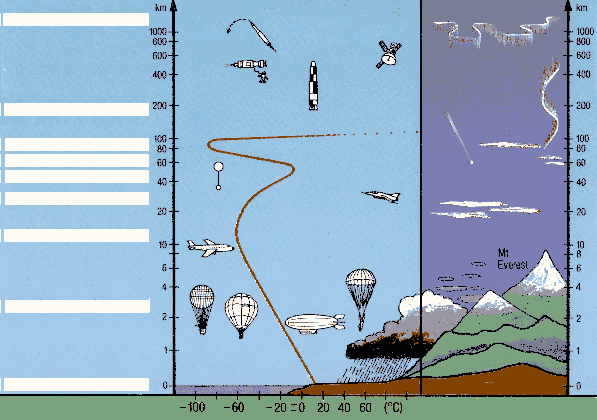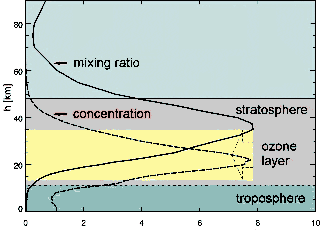|
|
 |
|
We divide the atmosphere into different layers.This is meaning, because each layer has its own characteristics. For example are different temperature trends, different radiation and different chemical reactions reasons for this. This worksheet may help you to find an orientation in our atmosphere.
|
 |
 |
|
© 2003 Seesing, Tausch; Universität-Duisburg-Essen, Duisburg
|
|
The earth's atmosphere and its layers
|
T1 |
Enter the following terms into the appropriate white lines of the picture above:
mesosphere, troposphere, sea level, stratosphere, stratopause, thermosphere, mesopause, tropopause |
|
T2 |
Draw in the ozone layer in two different ways: (Consider: both ranges should be distinguishable, although they overlap themselves!)
1. Use for it the values of the high ozone concentation as indicated in the graph below.
2. Use for it the values of the high ozone mixing ratio.
|
|
Ozone in the ozone layer protect us against the dangerous solar UV-radiation by filtering it out. This part of the light is converted into warmth.
|
|
 |
 |
|
ozone profiles (IUP Bremen)
Please click to enlarge!
|
|
 |
|
T3 |
Ozone concentration (e.g µg/m³) and mixing ratio (e.g.: %, ppm) are two different mesured variables.Which of the two graphs resembles more with the temperature profil of the stratosphere? Explain briefly your answer by regarding the locations of the maxima. | |
About this page:
Authors: M. Seesing, M. Tausch - Universitšt Duisburg-Essen, Duisburg / Germany
Scientific reviewing: Dr. John Crowley, Max Planck Institute for Chemistry, Mainz - 2004-05-04
Last update: 2004-05-24 |
|
 |
|









